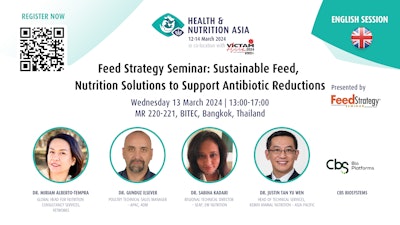Transcript of interview with Dr. Miriam Alberto-Tempra, global head of nutrition services, VetWorks
Jackie Roembke, editor-in-chief, Feed Strategy and WATT Feed brands: Hi, everyone. Welcome to Feed Strategy Chat. I'm your host, Jackie Roembke, editor-in-chief of WATT Feed brands. This edition of Feed Strategy Chat is brought to you by FeedStrategy.com. FeedStrategy.com is your source for the latest news and leading-edge analysis of the global animal feed industry.
Today we're joined by Dr. Miriam Alberto-Tempra. She is the global head for nutrition services at VetWorks. She's here to discuss antibiotic-free production efforts in Southeast Asia, taking a look at the nutritional solutions that are in play.
Hi Dr. Tempra. How are you today?
Hi, Jackie. Good morning.
Roembke: Good afternoon, or good evening, I should say. Well, let's get right into it. How do you see the landscape for antibiotic-free poultry and livestock production evolving in Southeast Asia?
Tempra: In the Southeast Asian region, I think the awareness is already in place, but we're not at the same stage as the U.S. or EU at this moment. But, you know, antimicrobial resistance (AMR) and food safety are always issues that are becoming more and more important for all stakeholders.
Gut health promotion is always in place. It's key that we really focus on this issue. We should discuss this with veterinarians, nutritionists, production people, farm owners, all the stakeholders. So the challenge now is how are we going to implement the antibiotic reduction or removal? Are we going to successfully replace it? This is the debate with all the alternatives that are emerging in the market. So, the ball is rolling and we're here to take that challenge.
Roembke: Now, given the diverse farming practices in the region, how do you tailor your approach to support antibiotic reductions or other goals in this area to suit different cultural, economic and environmental aspects?
Tempra: You know, Jackie, we might have different strategies, but our aim is simple. It's the goal of everyone: How we can effectively reduce or completely replace antibiotics in our farming systems? So I think we also need to consider, let's say, regulatory practices in different regions, and what works best in my farm may not be effective in your farm. This diversity and these variations must be considered all the time. I think if we can properly evaluate these issues or these possible hurdles, we can provide a holistic solution to antibiotic replacement.

Watch Dr. Tempra's presentation designed for Southeast Asian animal feed nutritionists and feed producers at the Feed Strategy Seminar, held at Health & Nutrition Asia, on March 13, 2024. For more details, click here.
Roembke: Can you share some specific examples of feeding and management techniques that have proven successful?
Tempra: I'm an animal nutritionist. In terms of feeding practices, or in animal nutrition, the most consistent so far that I have experienced is by improving the digestibility of the diet. And with the improvement in the same individual feeding region utilization, we can effectively reduce the use of antibiotics or maybe completely replace antibiotics because the digestibility of the diet will be further improved. For example, the utilization of feed enzymes. Over the years, I think enzymes have created this value of improving digestibility and maintaining a healthy gut.
Roembke: Excellent. Are there any innovations or emerging innovations that you're watching or hoping to come online that you think would have the most significant impact on these efforts?
Tempra: I have been reading a lot recently about biomarkers. And I think there's a growing interest in this diagnostic tool, this scientific innovation. With biomarkers, we can assess gut health status more efficiently and think faster than in the past, more quickly. And with this innovation, I think, we can bridge the gap between diagnosis and treatment, because we don't know what we're we are solving if we don't know the problem in the first place.
So I think with this innovation, we would be in a better position to trade what we know and to trade, what are missing in our, let's say, diets or in our feeding systems.
Roembke: Thank you so much. Now, if you'd be interested in hearing more from Dr. Tempra, and you'll be at Health & Nutrition Asia, please join us at the Feed Strategy Seminar focused on this topic where Dr. Tempra will be giving her presentation. Just so you know, the seminar takes place on March 13. You can find more information at feedstrategy.com.
Thank you so much Dr. Tempra. And thanks to you for tuning in. Thank you.

Sustainable feed, nutrition solutions to support antibiotic reductions
Date: Wednesday, 13 March 2024
Time: 13.00-17.00 hrs.
Location: BITEC, Bangkok, Thailand
Room: MR 220-221